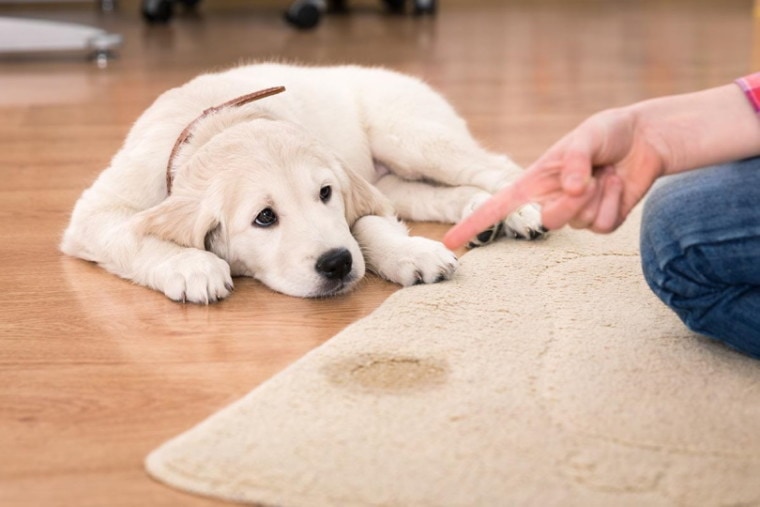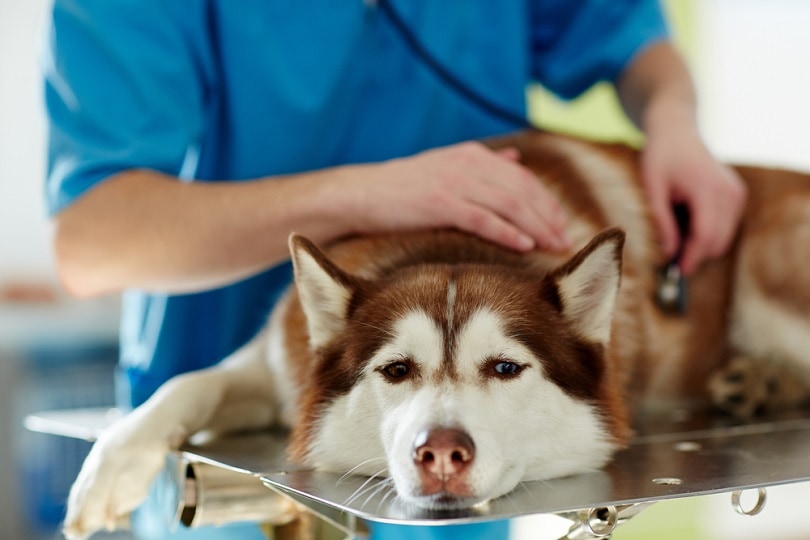
Frequent urination in dogs can stem from many different causes. It may be a sign of an underlying illness or a behavioral issue. It can be a challenge to determine the exact cause of frequent urination, and veterinarians are needed to step in to diagnose the issue.
Here are some common reasons for frequent urination and what to do in each situation.
4 Reasons Why Your Dog May Be Peeing a Lot
1. Dog Behavior

Sometimes, frequent urination can be attributed to behavioral causes. Dogs can start to pee a lot because of factors such as separation anxiety, urine marking, or being excited. Puppies and young female dogs are also more susceptible to submissive urination.
When your dog is urinating due to behavioral factors, it’s important not to respond with punishment, especially if the reason is due to anxiety or submissive urination. Punishment will most likely only increase the behavior.
Instead, after a vet check to make sure there are no medical concerns, you can work with a reputable dog behaviorist or trainer to redirect and eliminate the behavior.
2. Incontinence
Incontinence is involuntary urination that can be caused by different medical factors. Some dogs may have a urethral sphincter mechanism insufficiency (USMI). USMIs usually occur in adult female dogs who have urethral sphincters that weaken and can no longer hold urine. Some adult male dogs may become incontinent due to issues with their prostate.
Incontinence can also occur due to spinal damage or normal aging. Older dogs may develop other diseases as they age that affect their ability to hold urine, or they may become senile and be unaware when they urinate.
It’s best to schedule a visit to your veterinarian if you suspect your dog has become incontinent. Your veterinarian can conduct several tests and exams, such as a urinalysis, blood tests, and ultrasound, to determine the cause for incontinence. Some treatment may be available depending on the diagnosis.
3. Dog Bladder Stones
Sometimes, dogs may develop bladder stones that collect in the bladder, kidney, or urethra. Stones form when minerals in the dog’s urine start to bind together. If your dog has bladder stones, it may experience these additional signs:
If you suspect that your dog has bladder stones, it’s important to take your dog to the veterinarian as soon as possible. Sometimes, bladder stones can be dissolved with a change to a special diet. Others will have to be surgically removed.
If bladder stones are surgically removed, they can be examined to determine the type of mineral buildup. Prescription food is available to help prevent future buildup, so ask your vet for recommendations for a special diet such as this.
4. Dog Diseases and Infections
Frequent urination can be a symptom of other diseases and infections. Here are a few common possibilities that may cause your dog to pee a lot.
Cushing’s Disease
Cushing’s disease occurs when the adrenal glands next to the kidneys produce too much cortisone. Along with frequent urination, your dog may experience other signs:
Veterinarians can diagnose Cushing’s disease through a series of blood and urine tests and hormone screenings.
Dog Diabetes
Diabetes can cause dogs to pee more frequently and to start to drink more water. Dogs with diabetes may also exhibit these signs:
If you see any of these additional signs, take your dog to the veterinarian right away. Veterinarians can accurately diagnose diabetes through a series of tests.
Once a dog is diagnosed with diabetes, it’ll require lifetime treatment and care for managing diabetes. Maintaining stable blood sugar levels can help reduce the frequent urination.

Dog Kidney Disease
Unhealthy kidneys can also cause frequent urination because they help maintain water. If the kidneys aren’t functioning properly, it can lead to more frequent drinking and urinating. Dogs with kidney disease can show these additional signs:
It’s important to act quickly with kidney disease because it’s progressive. Your veterinarian will complete a series of tests to determine the severity of kidney disease and develop a treatment plan. Some common ways to treat kidney disease include medication, diet changes,and monitoring blood pressure.
- Related Read: Nutrition for Dogs with Kidney Disease
Urinary Tract Infection (UTI)
One of the most common reasons for frequent urination is UTIs. UTIs occur when bacteria travel up a dog’s urethra from the outside. If you suspect that your dog has a UTI, check for other common signs:
Veterinarians will complete a set of tests, including a urinalysis, to determine if a dog has a UTI. UTIs are easily treated with a round of antibiotics. Once your dog completes its antibiotic treatment, you can give your pup probiotics to support gut health. Keeping the area around the urethral opening clean can also help prevent your dog from contracting another UTI.
Final Thoughts
If your dog is peeing a lot, you’ll want to go to the veterinarian to determine the cause. You don’t want to wait too long because frequent urination is often a sign of another underlying condition or disease. Some causes are easily treatable while others require more time and attention.
Related reads:
- What are the Medication and Vet Costs for a Dog UTI?
- How to Get Urine Sample From a Dog: Vet-Reviewed Tips & Tricks
Featured Image Credit: Olimpik, Shutterstock








